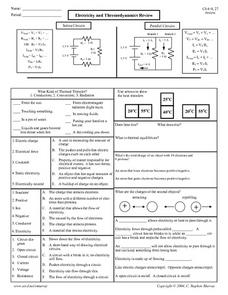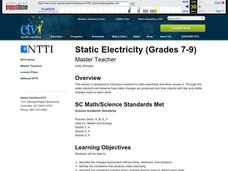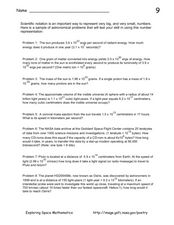Curated OER
Chemistry Final Exam Worksheet
For this chemistry worksheet, high schoolers take a final exam that is concerning the identification of the chemical compounds. The answers are also included.
Curated OER
Periodic Table
In this periodic table and elements learning exercise, high schoolers review valence electrons, octet rule, oxidation number, and the difference between metals and non-metals on the periodic table. This learning exercise has 5 matching,...
Curated OER
Ionic Bonds
In this ionic bond worksheet, students read about the transfer of electrons from one atom to another in ionic bonds. They answer seven questions about sodium and chlorine and draw Bohr-Rutherford diagrams to show the bonding between...
Curated OER
Electricity and Thermodynamics Review
In this electricity and thermodynamics worksheet, students review the major concepts of both series circuits and parallel circuits, they review types of thermal transfer, they match electricity terms with their definitions, they fill in...
Curated OER
Composition of the Atom
Students investigate the structure of the atom and its composition. For this atom structure lesson, students find the area of cut out circles and drop pens into the circles. They count the number of marks in the circles and relate their...
Curated OER
Ion (Derstand) Bonding through Energy Level Diagrams
Ninth graders investigate ionic bonding through energy level diagrams. In this ion bonding lesson plan, 9th graders observe demonstrations to show energy level diagrams using magnets to represent the subatomic particles. Students fill...
Curated OER
Exploring the Big Bang with the LHC
In this Big Bang Theory worksheet, students read about how scientists simulate the original Big Bang conditions using atom smashers. Students solve 4 problems given about the Big Bang. They find the average collision energy of particles...
Curated OER
Energy and Mass-Same Things But Different!
In this energy and mass worksheet, students read about Einstein's formula, E=mc2 and they solve six problems. They convert from different energy units to different mass units using a given formula.
Curated OER
What's the Matter? Locating Electrons in an Atom
Learners roll dice in order to simulate the probability of locating an electron in a certain region around the nucleus.
Curated OER
Winter
Students explore the nature of water and water molecules. They examine the role of ice on organisms.
Curated OER
A Hair Raising Experience
Fifth graders conduct an investigation using glass, metal ,fur, latex balloon, plastic bag and hair to generate static electricity of varying amounts. They predict, observe, make comparisons, and draw conclusions about static electricity...
Curated OER
Operating Kitchen Equipment
Learners spend this instructional activity discovering how electricity makes the appliances in their kitchen operate. In groups, they explain how energy is being converted in a microwave oven and practice giving others directions to how...
Curated OER
Static Electricity
Students are introduced to the concept of static electricity and its causes. After viewing video segments, they observe its effect on various objects. In groups, they discover how static electricity is produced and how objects with...
Curated OER
Speeding up the Fizz
Learners investigate temperature and chemical reactions. They explore the effect of temperature and particle size has on the rate of a simple chemical reaction. In addition, they graph their results and answer assessment questions.
Curated OER
Exponential Decay
Students study exponential decay and its application to radiocarbon dating. In this exponential decay lesson, students use candy to model the time it takes for something to decay. Students also graph the data they collect and...
Curated OER
Nuclear Chemistry
For this nuclear chemistry worksheet, students answer 9 questions. They balance nuclear equations, they write balanced equations, they calculate decay and they find binding energy of atoms.
Curated OER
Types of Chemical Reactions
In this chemical reactions worksheet, students are given directions about three types of reactions and how to write balanced equations for each. They then are given ten practice problems to complete using the information given.
Curated OER
Periodic Table Trends
In this periodic trends instructional activity, students solve ten problems related to elements in the periodic table. Students write electron configurations for atoms and they compare elements and their periodic trends.
Curated OER
What Information is on the Periodic Table?
In this elements learning exercise, students review the information that is found on a periodic table including atomic mass, chemical symbol, atomic, number, and electron configuration. This learning exercise has 7 fill in the blank...
Curated OER
Types of Chemical Reactions
For this chemical reactions worksheet, high schoolers read about the 3 types of chemical equations and how to write balanced ionic equations. Students are given 5 equations to balance, write the type of reaction, write the total ionic...
Curated OER
Solutions and Solubility Review
In this solutions and solubility review worksheet, students are given main ideas about intermolecular forces, concentrations of solutions, molar solutions, ionic equations, solubility rules, acids and bases and titrations. Students...
Curated OER
Application of Scientific Notation
In this scientific notation activity, students solve eight problems about the sun, the planets and the universe using very large numbers expressed in scientific notation.
Curated OER
Matter, Matter
Students define vocabulary related to the parts of the atom. In this matter lesson, students navigate the web to find the structure and the forces that affect atoms. Students complete an experiment with positive and...
Curated OER
Lightning!
Students use aluminum, a thumbtack, an eraser, and more to create static electricity. In this static electricity lesson plan, students use this experiment to simulate lightning.
Other popular searches
- Protons Neutrons Electrons
- Protons, Neutrons, Electrons
- Protons, Neutron, Electrons
- Protons and Neutrons
- Protons, Electrons, Neutrons
- Electrons, Neutrons, Protons
- Electrons and Protons
- Atoms and Protons
- Protons Neutrons, Electrons
- Atoms Electrons Protons

























